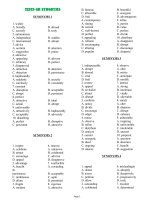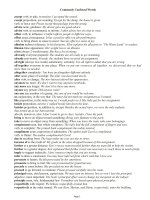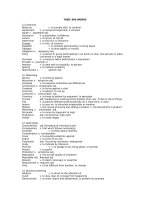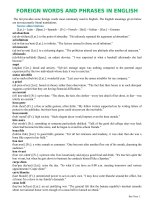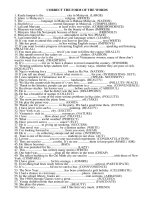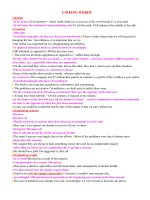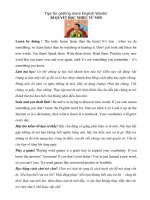LINKING WORDS
Bạn đang xem bản rút gọn của tài liệu. Xem và tải ngay bản đầy đủ của tài liệu tại đây (87.9 KB, 3 trang )
LINKING WORDS
1.Reality
-To be honest:To be honest (= what I really think is), it was one of the worst books I’ve ever read.
-To tell (you) the truth(used when admitting sth):To tell the truth, I fell asleep in the middle of her talk.
2.Contrast
-Although
-Nevertheless(despite sth that you have just mentioned):§There is little chance that we will succeed in
changing the law. Nevertheless, it is important that we try.
§Our defeat was expected but it is disappointing nevertheless.
-As opposed to(used to make a contrast between two things):
§200 attended, as opposed to 300 the previous year.
§ This exercise develops suppleness as opposed to (= rather than) strength.
-On the other hand(=on the one hand … on the other (hand) …)(used to introduce different points of
view, ideas, etc., especially when they are opposites):
§On the one hand they’d love to have kids, but on the other, they don’t want to give up their freedom.
-Whereas(used to compare or contrast two facts):
§Some of the studies show positive results, whereas others do not.
-In contrast to:The company lost $7 million this quarter in contrast to a profit of $6.2 million a year earlier
-Nonetheless(despite this fact)=Nevertheless:
§ The book is too long but, nonetheless, informative and entertaining.
§ The problems are not serious. Nonetheless, we shall need to tackle them soon.
-On the contrary(used to introduce a statement that says the opposite of the last one):
§‘It must have been terrible.’ ‘On the contrary, I enjoyed every minute.’
-As the matter of the fact=the fact (of the matter) is (that) …(used to emphasize a statement, especially
one that is the opposite of what has just been mentioned):
§A new car would be wonderful but the fact of the matter is that we can’t afford one.
3.Explaining reasons
-Because
-Because of
-Thanks to(words or actions that show that you are grateful to sb for sth):
§How can I ever express my thanks to you for all you’ve done?
-Owing to(=Because of)
-Due to sth/sb(caused by sb/sth; because of sb/sth):
§The team’s success was largely due to her efforts. §Most of the problems were due to human error
-Hence(for this reason):
§We suspect they are trying to hide something, hence the need for an independent inquiry
-After all(used when you are explaining sth, or giving a reason):
§He should have paid. He suggested it, after all.
4.Explaining results
-As a result:She died as a result of her injuries
-Consequently(=As a result; Therefore):
§This poses a threat to agriculture and the food chain, and consequently to human health.
-For that reason(=for the simple reason that):
§I had to do it for the simple reason that (= because) I couldn’t trust anyone else.
-Accordingly(=Therefore)((used especially at the beginning of a sentence) for that reason):
§The cost of materials rose sharply last year. Accordingly, we were forced to increase our prices.
-Thus=Hence=Therefore(as a result of sth just mentioned):
§He is the eldest son and thus heir to the title.
§ We do not own the building. Thus, it would be impossible for us to make any major changes to it.
5.Explaining purpose
-In order to
-So that
-Lest(=for fear that)(in order to prevent sth from happening):
§He gripped his brother’s arm lest he be trampled by the mob.
-For fear of sth / of doing sth= for fear (that) …(to avoid the danger of sth happening):
§We spoke quietly for fear of waking the guards.
§I had to run away for fear (that) he might one day kill me.
6.Concession/qualification
-Even so(=despite that):There are a lot of spelling mistakes; even so, it’s quite a good essay.
-Having said that(=even so)(used to introduce an opinion that makes what you have just said seem less
strong):I sometimes get worried in this job. Having said that, I enjoy doing it, it’s a challenge.
-Despite
-The fact that(=the fact (of the matter) is (that) …)(used to emphasize a statement, especially one that is
the opposite of what has just been mentioned):
§A new car would be wonderful but the fact of the matter is that we can’t afford one.
7.Starting a point
-To start with(used when you are giving the first and most important reason for sth):
§To start with it’s much too expensive …
-First of all(before doing anything else; at the beginning):First of all, let me ask you something.
-For one thing(used to introduce one of two or more reasons for doing sth):
§‘Why don’t you get a car?’ ‘Well, for one thing, I can’t drive!’
-In the first place(used at the end of a sentence to talk about why sth was done or whether it should
have been done or not):§I still don’t understand why you chose that name in the first place.- I should never
have taken that job in the first place.
-In the first, second, etc. place(used at the beginning of a sentence to introduce the different points you
are making in an argument):Well, in the first place he has all the right qualifications.
-For one thing(used to introduce one of two or more reasons for doing sth):
§‘Why don’t you get a car?’ ‘Well, for one thing, I can’t drive!’
-Incidentally(used to introduce a new topic, or some extra information, or a question that you have just
thought of )=by the way:Incidentally, have you heard the news about Sue?
8.Adding to a point
-As well (as)(in addition to sb/sth; too):Are they coming as well?
§They sell books as well as newspapers. §She is a talented musician as well as being a photographer.
-Along with sb/sth(in addition to sb/sth; in the same way as sb/sth):
§She lost her job when the factory closed, along with hundreds of others
-Together with(in addition to; as well as):I sent my order, together with a cheque for £40.
-Both … and …= Not only … but also …:Both his mother and his father will be there.
§ For this job you will need a good knowledge of both Italian and Spanish
-In addition (to)(sb/sth)(used when you want to mention another person or thing after sth else):In
addition to these arrangements, extra ambulances will be on duty until midnight.
§There is, in addition, one further point to make.
-On top of sth/sb(in addition to sth):He gets commission on top of his salary.
§ On top of everything else, my car’s been stolen.
-By the way(used to introduce a comment or question that is not directly related to what you have been
talking about):By the way, I found that book you were looking for.
§ What’s the time, by the way?
§ Oh by the way, if you see Jackie, tell her I’ll call her this evening.
-At least(used to add a positive comment about a negative situation):
§She may be slow but at least she’s reliable.
-Indeed(used to add information to a statement):I don’t mind at all. Indeed, I would be delighted to help
-What is more(used to add a point that is even more important):You’re wrong, and what’s more you know
it!
9.Developing a point
-Besides(in addition to sb/sth; apart from sb/sth):We have lots of things in common besides music.
§Besides working as a doctor, he also writes novels in his spare time.
§ I’ve got no family besides my parents.
-Furthermore=Moreover(in addition to what has just been stated. Furthermore is used especially to add
a point to an argument):
§He said he had not discussed the matter with her. Furthermore, he had not even contacted her.
-In addition (to)(sb/sth)
-Anyway=Besides(used when adding sth to support an idea or argumen):
§It’s too expensive and anyway the colour doesn’t suit you.
§ It’s too late now, anyway.
10.Making generalization
-In general(usually; mainly):In general, Japanese cars are very reliable and breakdowns are rare
-By and large(used when you are saying something that is generally, but not completely, true):
§By and large, I enjoyed my time at school.
-On the whole(considering everything; in general):On the whole, I’m in favour of the idea.
-Broadly speaking(generally, without considering details orused to show that what you are saying is
true in a general, etc. way):
§Broadly speaking, I agree with you or Generally speaking, the more you pay, the more you get.
§ There are, broadly speaking, two ways of doing this.
§ Personally speaking, I’ve always preferred Italian food.
11.Others
-And then, to make matters worse, his parents turned up
-At any rate(used to show that you are being more accurate about sth that you have just said):He said
he’ll be coming tomorrow. At any rate, I think that’s what he said(used to show that what you have just
said is not as important as what you are going to say):There were maybe 60 or 70 people there. At any
rate, the room was packed.
-He was too trusting—or, to put it another way, he had no head for business.
-They've had a very difficult time.On top of that, their home was burgled
-To some extent what she argues is true
- In conclusion, (= finally) I would like to thank …
CONJUNCTIONS
-No less than :You no less than he are very rich.
-Or/Else/Otherwise:We have to work hard, or/else/otherwise we will fail the exam.
-Not with standing that: He is poor not with standing that he works very hard


